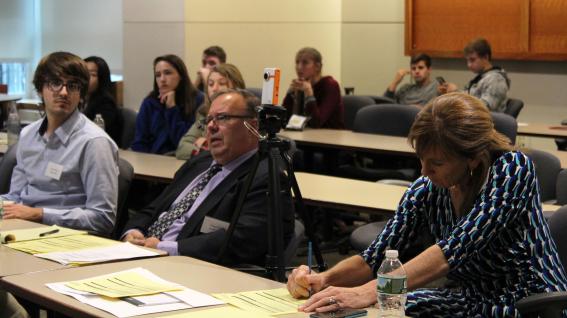Students Sharpen Skills in First Annual Isenberg Ethics Competition
October 13, 2016
Isenberg students gained valuable insights and sharpened their analytical and presentation skills on September 30th at the school’s first Annual Isenberg Ethics Competition. The five-hour event featured an inspiring keynote speaker, workshops that explored ethical issues and case competition skills, and the competition itself. In the latter, five teams—each with two Isenberg students—squared off to dissect ethical decision points at a banking company.

Evaluated by four judges (two Isenberg alumni and two members of the school’s business law faculty), * the competition yielded four winning teams that will represent Isenberg in two national case competitions. The first, the Intercollegiate Business Competition, will hold its finals in Kingston, Ontario in January. Two years ago, an Isenberg team placed first in that event, besting five other finalists. Isenberg will field a second team to compete in another contest, the International Business Ethics Competition, which will hold finals in Santa Monica in April.
“It’s not our job to tell you how to be ethical,” observed event organizer Jennifer Merton, Senior Business Law Lecturer at Isenberg. “We are here to help you unpack ethical dilemmas by giving you frameworks; by giving you perspectives,” she told the students in one of the workshops. To that end, students employed a rubric-based checklist that tracked issues and stakeholder interests, ethical and legal alternatives and consequences, and implementation of their choices into business decisions.
Issues and Trends
The afternoon’s keynote speaker, Thomas I. White, explored what he described as the current “assault on truth and dignity.” Today’s avalanche of information and perspectives can cloud the truth, noted White, who is Conrad H. Hilton Professor of Business Ethics at Loyola Marymount University in Los Angeles. You must vigilantly avoid conflating facts with opinion, he continued. Global warming, for example, is not conjecture or opinion but science. We need to understand and abide by standards of scientific proof.
As for the assault on dignity, the antics of “mean people” have gained growing traction. For a striking example of manipulation and rumor, the misinformation around Barak Obama’s birth certificate is instructive, he lamented.
In a subsequent workshop, White and other panelists discussed unethical business missteps, including the abuse of dolphins by Sea World and the Wells Fargo customer fraud case. The science is indisputable, he said, that dolphins “have self- and social awareness.” The industry has to move away from their captivity to alternatives like theme park rides.
The 5,300 employees fired by Wells Fargo were not only deep-sixed from the company but from banking itself, he continued. They are considered toxic to the industry. Fellow panelist and Isenberg alumnus Matt Minafo ’16 chimed in with a warning: “Never forget that you have a [personal] brand and reputation. Don’t sacrifice that for a little more money,” he told the students.
*Gina Semensi ’16, Oliver Thibault ’16, Frank Caruso, Kelly Glidden O’Conner
And now, let’s hear it for the winners:
Nicole Moschella and Nikhila Nandgopal—First place
Zachary Gross and Patrick Bannon—Second place
Matthew Doheny and Brian Campbell--Third place
Eunji Cho and Jua Seo—Fourth place